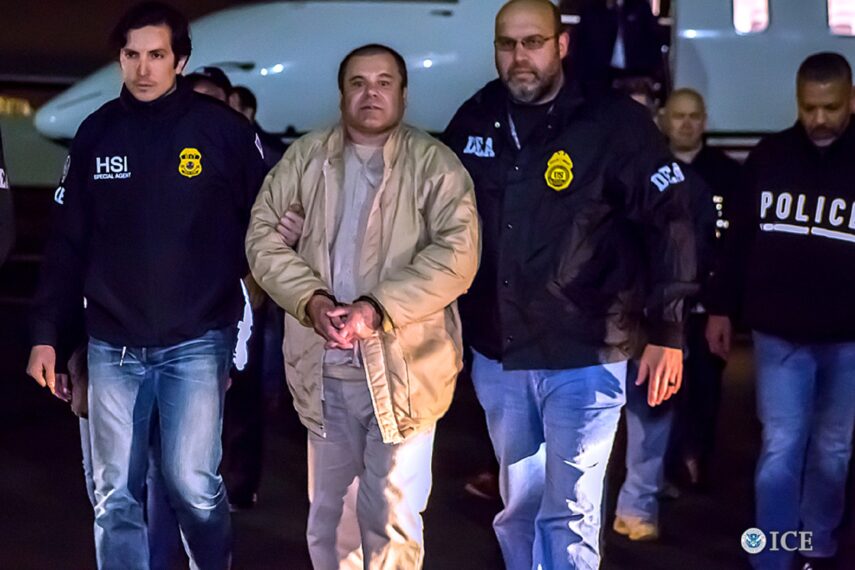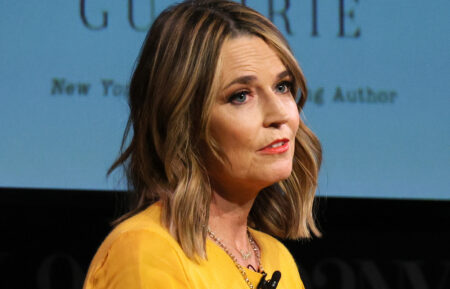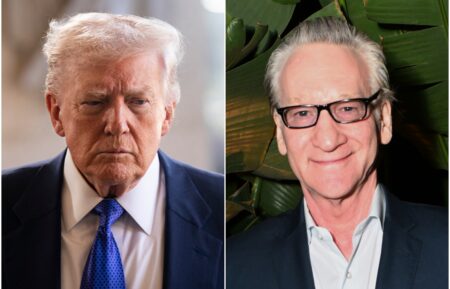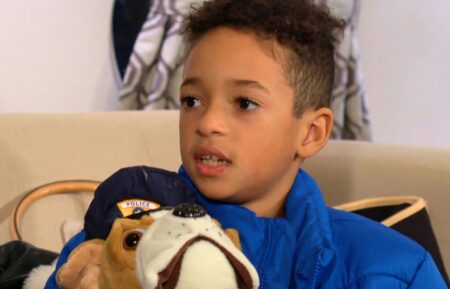El Chapo’s Wife Breaks Silence on Life With Drug Kingpin in Explosive New Oxygen Documentary

Exclusive
What To Know
- Emma Coronel Aispuro, wife of Joaquín “El Chapo” Guzmán, gives her first in-depth interview in the Oxygen documentary “Married to El Chapo: Emma Coronel Speaks,” candidly discussing her life, choices, and survival in the world of the Sinaloa Cartel.
- The documentary explores Coronel’s journey from a teenage beauty queen to the spouse of a notorious drug lord, her struggles with loyalty, accountability, and the emotional armor she developed to cope with public scrutiny and personal trauma.
- Coronel expresses remorse for the victims of her husband’s actions, reflects on her relationship with her daughters, and seeks to reclaim her narrative by sharing her perspective and vulnerabilities for the first time on camera.
Emma Coronel Aispuro, the wife of Joaquín “El Chapo” Guzmán, breaks her silence in an unprecedented and exclusive interview for Married to El Chapo: Emma Coronel Speaks. The Oxygen two-part special delves into how a teen pageant queen fell in love with the Sinaloa Cartel kingpin. A Mexican drug lord not only 32 years her senior, but a fugitive who famously escaped a maximum-security prison by riding a motorcycle through a mile-long underground tunnel.
A conflicted Aispuro gets candid about the choices she made to protect her family and survive “a world ruled by power, violence, and loyalty.” The 36-year-old faces ugly truths of her husband’s actions while grappling with her own accountability. Aispuro also opens up about what life is like since being released from federal prison in 2023. She served a reduced sentence of more than two years for charges including drug trafficking and money laundering. Adding to the doc are recounts from attorneys, investigators and reporters who coerced the notorious criminal cases.
The project comes from executive producers Mary Robertson (a director of critically acclaimed documentary Quiet on Set: The Dark Side of Kids TV), Maxine Productions founder, and Frida Torresblanco, Hangtime International Pictures founder and co-CEO. Ahead of the November 28 premiere, the two talk about the making of the special.
How did this particular project come about?
Mary Robertson: Married to El Chapo: Emma Coronel Speaks began with a long runway of trust. Frida had spent years building a genuine relationship with Emma long before we ever considered making a documentary. Soon after Quiet on Set was released, Frida and I were introduced by Cori Abraham at Versant. In our first conversations, it became immediately clear that Frida and I shared a creative and philosophical alignment; a commitment to centering women, both in front of and behind the camera, and a willingness to ask difficult questions while embracing complicated answers.
We decided right away that we wanted to join forces to bring Emma’s story to the screen. Her life, going from a teenage beauty queen from a ranch in Durango to the wife of Joaquín “El Chapo” Guzmán, is one of the most mythologized and least understood narratives in contemporary culture. We wanted to explore that story from Emma’s own perspective, in her own voice.
Soon after, two collaborators I know and trust deeply, director Ted Bourne and seasoned journalist and documentarian Monica Villamizar, came on board. That team alignment allowed us to approach this film with rigor, sensitivity, and intention from day one.
What was the process like in getting Emma to sit down with you for the documentary?
Mary Robertson: Because Frida and Emma already had a relationship built over years, we entered the process with trust, something incredibly rare in a story of this magnitude. Emma has lived much of her adult life under public scrutiny, legal pressure, and media distortion. For her to sit down for the first time in an unprecedented, in-depth interview required an environment where she felt safe to look deeply within herself for answers that were previously unarticulated, perhaps event to herself.
Emma had to feel emotionally and mentally ready to revisit events that were not only personal and profound but connected to some of the most powerful criminal and political forces in the hemisphere. We weren’t interested in a sensationalized account. We wanted a fair, clear, and human account of a woman whose story is often defined by her proximity to others. Once she made the decision to participate, Emma showed up with remarkable candor.
What were the main challenges in getting the doc going?
Mary: Our challenge as filmmakers was to build the right space for that honesty. A space that acknowledged the gravity and complexity of her world where we could ask the tough questions around her agency and her responsibility while giving her a platform to speak for herself, about herself, often for the first time. Her willingness to do that set the tone for the entire production.
How was it getting Emma to open up and breaking down walls she may have put up for fear of legal, criminal, or life-threatening ramifications?
Frida Torresblanco: It was a gradual process. The result of many conversations since the day we met, and of her own personal growth through therapy and maturity. By the time we decided to make the documentary, Emma was ready to speak, to tell the story of her life in her own words and from her own point of view. It came from a genuine need, because she mentioned that everything known about her so far has been filtered through other people’s interpretations; people who have no real sense of what she has lived through. And when she finally spoke, she did so openly and with disarming honesty.
Was there anything particularly eye-opening about her responses or body language? She seemed composed and stoic through much of it.
Frida: Emma speaks in the film of the need to maintain emotional discipline, yet she’s someone who has learned to master her reactions and present herself with confidence. There were moments when she mentioned feeling very cold, and a few small gestures. The way she moved her hands, the pauses in her voice when she spoke about certain events, revealed that beneath that serenity there was a tremendous weight. She mentioned that her stoic façade wasn’t coldness, it was the only defense she had left.

NEW YORK, NY – JANUARY 19, 2017: Joaquin Archivaldo Guzman Loera, aka El Chapo, arrives in New York following his extradition to the United States from Mexico. (Photo by Ted Psahos/U.S. Immigration and Customs Enforcement via Getty Images)
Do you find that was her sort of armor?
Frida: Yes, she told me that in the past her way of speaking, her posture, even the way she breathed, were all defense mechanisms. A way of protecting herself. That armor allowed her to get through years of uncertainty, fear, and guilt without falling apart. But now she’s ready to show her true self, and to speak openly about her vulnerabilities as well.
She still holds affection for Joaquin, even after all she has been through and her family going to prison. Even the fact there is some evidence of infidelity. Did that surprise you?
Frida: More than surprising me, it served as a reminder of just how unusually complex human emotions and relationships can be. Emma was a child when she met him. From the outside, it’s easy to see it as a contradiction, but for her, El Sr (that’s what she calls him), represented her transition into womanhood. For years, he was her world, her stability, her companion, the only man she gradually learned to love.
Love doesn’t simply disappear because the truth is devastating. Sometimes it lingers, distorted, intertwined with pain. Her affection didn’t justify anything, but it did reveal how deeply trapped she was in a life where loyalty and survival had become indistinguishable.
There is a brief conversation captured in the doc between Emma and one of her daughters. Did you get a sense of how the children feel about their dad and everything that has gone down?
Frida: She has two young daughters. They love both their mother and their father. Emma speaks about them with admiration, tenderness, and deep devotion. She says they are brave, generous girls. That unconditional love is what now drives her to try to be a better human being every single day. As they grow older, they will go through their own process of understanding what happened and of making sense of who their father figure truly is.
Has Emma seen the doc yet? If so, what was her reaction?
Frida: After the film was finished, Emma watched it. It was a difficult experience for her. She said it was like seeing herself from the outside for the first time, confronting without filters the decisions and emotions she had been processing for years.
You could really see Joaquin’s almost charm in action with how not only Emma feels about him, but also his attorney, Mariel. How was it showing this other side?
Frida: It was essential to show the perspective of those who lived alongside him. If we had only presented Joaquin as the figure tied to the crime, the story would have been incomplete. His personality, in some way, explains why so many people trusted him and how he was able to manipulate situations for so long. Showing that magnetism wasn’t about humanizing him or excusing his actions, but about providing context for his power.
Toward the end of the doc, she showed remorse for the victims and family affected her husband and his operation. This came after pretty much sticking to her story that she didn’t witness these horrible acts
Frida: The first thing to remember is that this was the first time Emma opened the door to her own experiences and memories on camera. She had reached a point of sensibility and maturity that allowed her to ask for forgiveness. I think it was the first moment she let her guilt surface without resistance. It wasn’t a confession, but an acknowledgement of the harm caused. The confrontation that was missing remained unspoken. The remorse, however, was an act of humanity. Capturing that was one of the most striking moments of the entire production.
Married to El Chapo: Emma Coronel Speaks premiere, November 28, 8/7c, Oxygen








